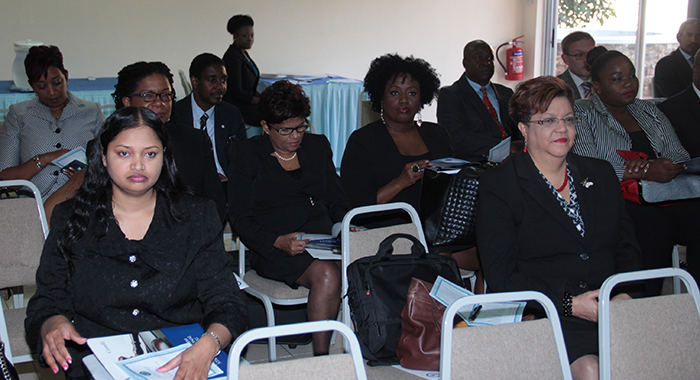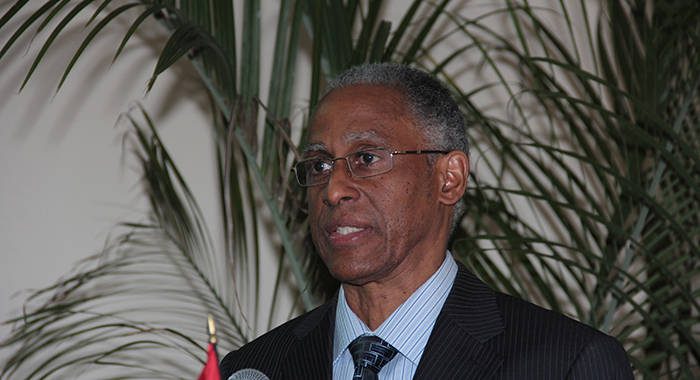A distinguished regional judge believes that the criminal justice system in most, if not all, Caribbean countries is “broken”.
Justice Adrian Saunders, a judge at the Caribbean Court of Justice (CCJ), made the observation in St. Vincent on Thursday as he addressed the inaugural meeting of the Advisory Committee on Criminal Justice and Magisterial Reform, under the Judicial Reform and Institutional Strengthening (JURIST) Project.
“It would probably be a fair characterisation to say that in most, if not all of our states, today, the criminal justice system is broken,” he told the opening ceremony for the two-day gathering.
Saunders said that in one CARICOM state, recently, a man who had been in custody for nine years on a murder charged had his case dismissed before the judge, who found that he had no case to answer.
“Nine years in custody; no case to answer,” Saunders emphasised.
In another case, he said, a man is charged with a fairly simple traffic offence and is adamant that he is not guilty.
There is no dispute about the facts, Saunders told the audience, adding that the only issue is the legal interpretation of a very small section of the traffic law in that country, which he did not identify.
“The man and his lawyer interpret that section one way and the police interpret it another way,” Saunders said.
The case has been going on for over two years and throughout that time, the accused person and his lawyer has been spending two to three “entirely unproductive hours in court only to be told that they must return the following month,” the judge said.
Saunders gave a third example, saying that judges at the CCJ recently heard an appeal in a case in which a man has been found guilty of rape and had been sentenced to a term of years in prison, which he did not disclose.
“He appealed all the way up to us (CCJ). When we examined the documents in the appeal, we discovered that although the man was still in custody, he really should have been released sometime before, because he had already served his sentence,” Saunders said.
“Each of you must have your own examples because these are not uncommon things that happen throughout the region,” he told the gathering, which included several judges, two directors of pubic prosecution and other members of the judicial system from across the Caribbean Community (CARICOM).
“Frankly, viewed objectively, all of this amounts to an abuse of the people of the Caribbean, especially because it not only involves a massive wastage of time and resources, but it also implicates the liberty of the individual, in a context where there is very little accountability,” Saunders said.
“Caribbean people deserve a whole lot better,” he further stated, adding, “And it is incumbent upon those who work in the justice sector to work towards its improvement.”
Saunders, however, said that his comments are not to say that there are not valiant efforts being made at introducing very useful reform initiatives.
He said reform initiatives are underway in St. Vincent and the Grenadines and other countries.
“But, it is also true to note that criminal justice reform is not an easy task. It is certainly not as easy to accomplish as civil justice reform,” he said.

The Advisory Committee was established under the JURIST Project and is tasked with reviewing criminal justice and magisterial reform initiatives in the Caribbean and making recommendations for improving the quality of justice delivery and reducing delay in the criminal justice system.
The JURIST Project is a five-year regional Caribbean judicial reform initiative funded under an arrangement with the Government of Canada.
It is being implemented on behalf of Global Affairs Canada and the Conference of the Heads of Judiciary of CARICOM, by the Caribbean Court of Justice (CCJ), which was appointed by the Conference as its Regional Executing Agency (REA).
The Project is working with judiciaries in the region to support their own efforts to improve court administration and strengthen the ability of the courts and the judiciary to resolve cases efficiently and in a timely fashion.
Criminal Justice and Magisterial Reform falls under the Project’s overarching goal of delay and backlog reduction in courts.
The Project is currently being implemented in at least six countries but will be expanded to include other territories in the region.
Special attention will also be paid to building the capacity and skills of judges, court administrators and court personnel to deliver services that address the needs of women, men, girls and boys.
The Advisory Committee is comprised of a broad range of stakeholders from across the region and the criminal justice system including appellate and trial court judges, magistrates, Directors of Public Prosecutions, and a criminologist among others.







I used to think the Justice System in SVG was actually very good but in the past years they may have become even worse than the USA. I think about the incidents where someone with one Ganja cigarette gets a year in jail and a government official that steals over 1/4 million does not spend one day, instead comes out ahead over 10,000 dollars. Or, consider Venezuelans that murder Customs Officials and the government lets the go free.
Yes, and of course court cases take too long. How long has it been taking he courts to determine if there was election fraud in SVG? If we are lucky, they may have made a determination before the next election!
It’s broken, yes. With a huge fault line cutting through from crown to core. Good luck, Justice Saunders, try don’t make them wear you down. Look at the empty chairs at this event. The place ought to have been ram-packed. That alone says most of what is needed to know.
Jeannine, Saunders is as much a part of the problem as the rest. He is not just part of the “broken system,” he represents the top of the broken system.
Judge Saunders is part and parcel of this broken system.
Thank God we still have the Privy Council as our final court of appeal!